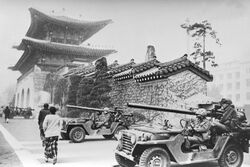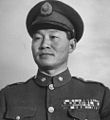User:Britbong64/Sandbox
| 1970 Xiaodongese coup d'état | |||||||
|---|---|---|---|---|---|---|---|
 Army units deployed on the streets of Kuoqing during the coup. | |||||||
| |||||||
| Belligerents | |||||||
|
|
| ||||||
| Casualties and losses | |||||||
|
| |||||||
The 1970 Xiaodongese coup d'état known in Xiaodong as the ==Emperors of Xiaodong==
Xiang dynasty
| # | Picture | Name (Translation) |
Emperor From | Emperor Until | Notes |
|---|---|---|---|---|---|
| 1 |  |
Jianzhao (建昭) To Establish Light |
650 | 621 | Probably fictional. Establish Xiang Dynasty |
| 2 | tba | tba (tba) tba |
621 | 598 | tba |
| 3 | tba | tba (tba) tba |
598 | 574 | tba |
| 4 | tba | tba (tba) tba |
574 | 548 | tba |
| 5 | tba | tba (tba) tba |
548 | 511 | tba |
| 6 | tba | tba (tba) tba |
511 | 486 | tba |
| 7 | tba | tba (tba) tba |
486 | 444 | tba |
Sun dynasty
Tao dynasty
Jiao dynasty
| # | Picture | Name (Translation) |
Emperor From | Emperor Until | Notes |
|---|---|---|---|---|---|
| 1 |  |
Tianfan (天繁) Heavenly Prosperity |
17 March 1356 | 4 June 1372 | |
| 2 |  |
Dazhe (大者) Great Sage |
4 June 1372 | 14 April 1392 | |
| 3 |  |
Laiping (来平) To Bring Peace |
14 April 1392 | 2 October 1401 | |
| 4 |  |
tba | 2 October 1401 | 5 September 1453 | |
| 5 |  |
tba | 5 September 1453 | 16 April 1497 | |
| 6 |  |
tba | 16 April 1497 | 17 March 1534 | |
| 7 |  |
tba | 17 March 1534 | 4 February 1562 | |
| 8 |  |
tba (tba) tba |
4 February 1562 | 15 March 1591 | tba |
| 9 |  |
tba (tba) tba |
15 March 1591 | 12 June 1602 | tba |
| 10 |  |
tba (tba) tba |
12 June 1602 | 4 October 1632 | tba |
| 11 |  |
tba (tba) tba |
4 October 1632 | 15 March 1658 | tba |
| 12 |  |
tba (tba) tba |
15 March 1658 | 7 April 1666 | tba |
| 13 |  |
tba (tba) tba |
7 April 1666 | 14 May 1667 | tba |
Toki dynasty
| # | Picture | Name | Emperor From | Emperor Until |
|---|---|---|---|---|
| 1 |  |
Toki Sinzou | 1660 | 1684 |
| 2 |  |
Toki Banrei | 1684 | 1723 |
| 3 |  |
Toki Hatoyama | 1723 | 1757 |
| 4 |  |
Toki Yousuke | 1757 | 1774 |
| 5 |  |
Toki Kobayasi | 1774 | 1812 |
| 6 |  |
Toki Seizi | 1812 | 1833 |
| 7 |  |
Toki Hayato | 1833 | 1858 |
Yao dynasty
| # | Picture | Name (Translation) |
Emperor From | Emperor Until | Notes |
|---|---|---|---|---|---|
| 1 |  |
Xiyong (熙雍) Prosperous Harmony |
1864 | 1901 | Established Heavenly Empire. |
| 2 |  |
Qingzhuo (清㒂) Pure Tranquillity |
1901 | 1922 | Overthrown in a coup d'état. |
| 3 |  |
Shanrong (善荣) Benevolent Glory |
1922 | 1934 | Senrian-Xiaodongese War. |
Leadership
- Sun Yat-sen - 1940-1942
- Hu Shih - 1942-1947
- Liu Shaoqi - 1947-1961
- Tanaka Kakuei - 1961-1970
- Ferdinand Marcos - 1970-1984
- Roh Tae-woo - 1984-1988
- Jiang Zemin - 1988-2005
- Xi Jinping - 2005-2016
- Abe Shinzō - 2016-present
- Chen Cheng - 1940-1942
- Ren Bishi - 1942-1945
- Zhou Enlai - 1945-1965
- Sun Fo - 1965-1970
- Chun Doo-hwan - 1970-1977
- Roh Tae-woo - 1977-1984
- Hu Yaobang - 1984-1988
- Zhao Zhiyang - 1988-1992
- Abe Shintarō - 1992-1994
- Qiao Shi - 1994-1998
- Hu Jintao - 1998-2008
- Abe Shinzō - 2008-2016
- Li Keqiang - 2016-present
- Soong Ching-ling - 1940-1944
- Chen Cheng - 1944-1952
- Tanaka Kakuei - 1952-1961
- Chen Yun - 1961-1970
- Yang Shangkun - 1970-1977
- Hu Yaobang - 1977-1984
- Hau Pei-tsun - 1984-1988
- Qiao Shi - 1988-1994
- Wen Jiabao - 1994-1998
- Li Ruihuan - 1998-2002
- Xi Jinping - 2002-2005
- Nguyễn Tấn Dũng - 2005-2018
- Kim Yo-jong - 2018-present
- Liu Shaoqi - 1940-1946
- Dong Biwu - 1946-1960
- Sun Fo - 1960-1966
- Zhang Chunqiao - 1966-1970
- Trường Chinh - 1970-1984
- Jiang Zemin - 1984-1988
- Yang Shangkun - 1984-1999
- Wu Bangguo - 1999-2009
- Wang Yi - 2009-present
Period
- Disciplined democracy period (有纪律的民主时期; Yǒu jìlǜ de mínzhǔ shíqí) - 1940-1970
- Government - De facto single party state; civilian-bureaucratic dictatorship.
- Economy - Statist, but accommodating of private enterprise.
- Foreign policy - Largely peaceful; supportive of decolonisation
- Society - Relatively free cultural atmosphere.
- Rejuvenation period (再生时期; Zàishēng shíqí) -1970-1988
- Government - Military junta with reliance on revolutionary violence.
- Economy - Much more state-orientated; effectively a command economy.
- Foreign policy - Very aggressive and anti-Senrian.
- Society - Incredibly restrictive and conservative; focus on purging moral decadence.
- Hundred Flowers period (百花齐放时期; Bǎihuāqífàng shíqí) - 1988-2017
- Government - Dominant-party state with stronger rule of law.
- Economy - Market socialism.
- Foreign policy - Assertive but focus on multilateralism.
- Society - Largely free but with some conservative restrictions.
- Normalisation period (拨乱反正时期; Bōluànfǎnzhèng shíqí) - 2017-present
- Government - Dominant-party state with personalist rule.
- Economy - Market socialism.
- Foreign policy - Assertive but focus on unilateralism.
- Society - Much more restricted; focus on depoliticisation.
Chashan Summit
Held in 194X in the Kuthine city of Chashan. Held amongst the nations of Coius where they produced X point declaration that endorsed decolonisation in the region in the context of the Solarian War. Attendees and topics partly dependent on time - pre-, during or post- Solarian war.
Shangea takes a relatively passive position at the summit and mainly affirms its commitment to decolonisation. Any discussion on the Treaty of Keisi would see the Shangeans avoid the topic and claim its a bilateral matter between Senria/Kuthina.
Attendees
Declaration
This summit affirms...
- Respect for self-determination, sovereignty and territorial integrity of all nations.
- Respect the human rights outlined in the Community of Nations Charter.
- Respect for the right of each nation to defend itself, singly or collectively, in conformity with the principle of international peace.
- The settlement of all international disputes by peaceful means, such as negotiation, conciliation, arbitration or judicial settlement as well as other peaceful means of the parties own choice, in conformity with the charter of the Community of Nations.
- Acts of aggression will not be used to solve international disputes and rather adequate guarantees are to be given that national armaments will be reduced to the lowest point consistent with domestic safety.
- the principle of equality of all races and calls for the abolition of racial discrimination.
In line with the affirmed principles the assembled nations at this summit call for the people of the Weranian, Etrurian and Estmerish empires, whose place among the nations we wish to see safeguarded and assured, should be accorded the freest opportunity to self-determination.
Major disputes
- Role of socialism
- Status of Asteria
- Future of Satria
- Reform to the CNSC system
Civil War leaders
- Republican Socialist Party (共和社会党; Gònghé shèhuìdǎng) - National Principlism, party of power
- Shangean Peasants' and Workers' Democratic Party (晓东农工民主党; Xiǎodōng nónggōng mínzhǔdǎng) - Socialism, pro-government
- Prosperity League (繁荣联盟; Fánróng liánméng) - Economic interests, pro-government
- Democratic Constitutionalist Party (民主宪政党; Mínzhǔ xiànzhèng dǎng) - Liberalism, anti-government
- National Socialist Party (国家社会党; Guójiā shèhuìdǎng) - Neo-National Principlism, pro-governmentish
- Revive the Light Society (光復會; Guāngfùhuì) - Religious revialism, pro-government
- National Loyalty Party (全民忠义党; Quánmín zhōngyì dǎng) - Conservatism, anti-government
- New Peoples' Society (新民會; Xīnmín huì) - Conservatism, anti-government















